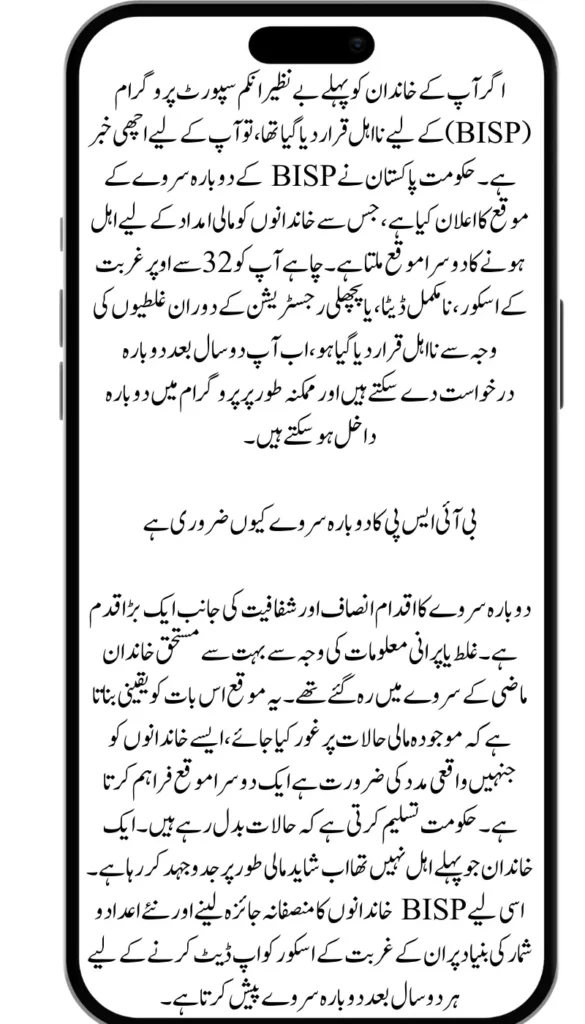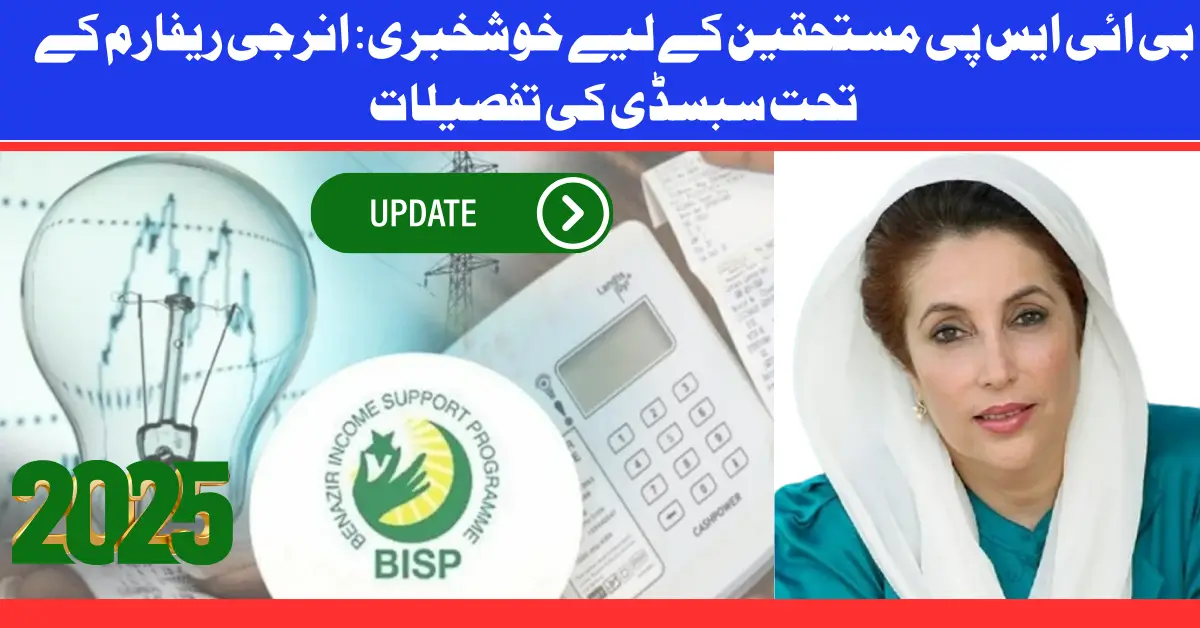Table of Contents
Electricity and Gas Relief for BISP Beneficiaries
The Government of Pakistan is launching a major reform in its energy subsidy policy, aiming to assist only the truly deserving segments of society. As outlined in the 2025 Energy Reform Plan, Electricity and Gas Relief for BISP Beneficiaries will be prioritized, ensuring that subsidies are granted solely to individuals enrolled in the Benazir Income Support Programme (BISP). This major policy shift is part of a broader effort to improve the country’s fiscal health, promote fairness, and ensure that public resources are used wisely.
Understanding the Energy Reform Plan for BISP Beneficiaries
The new Energy Reform Plan targets financial aid more effectively. For years, subsidies were provided across the board, meaning both poor and rich households received the same level of financial support. This created inefficiencies and drained national resources.The reform, supported by the International Monetary Fund (IMF) and the World Bank, aims to:
- Reduce financial losses in the energy sector
- Stop subsidizing high-energy consumers who can afford full prices
- Support only the poor and deserving families through BISP verification
Only those verified by BISP will get electricity and gas subsidies starting January 2027. The verification process is set to conclude by December 2025.
How 8171 BISP Online Messages Are Verified to Detect Scammers
How to Qualify for the Subsidy?
If you want to get this subsidy from the Government of Pakistan, you must first meet its eligibility criteria and then you can benefit from this program, which is explained below.
- Be a BISP beneficiary: Only families registered with BISP will be eligible.
- Have a PMT score below 32%: This poverty score is calculated based on your income and living conditions.
- Complete the NSER survey: This survey, conducted by BISP, helps determine your financial condition and eligibility for assistance.
If you’ve received recent payments from BISP or provincial programs like Punjab Ehsaas, you may already qualify.

How to Lower Your PMT Score?
Eligibility for the new subsidy scheme requires a poverty score of less than 32%. If it’s higher, you’ll need to update your information through the NSER (National Socio-Economic Registry) survey at the nearest BISP office.Completing this survey accurately is essential, as it directly impacts your eligibility for upcoming government assistance programs including:
- Power and gas subsidies
- Cash support
- Food security initiatives
CM Maryam Nawaz Launches Pioneering Free Insulin Program for Children with Diabetes
Cheap Electricity for the Deserving
People already receiving cash aid under BISP will now get cheap electricity too. This two-fold support financial aid + reduced utility costs is a major step to:
- Relieve financial stress
- Improve quality of life for low-income households
- Promote energy conservation by encouraging responsible usage
Why Is the Subsidy Model Changing?
For years, Pakistan’s energy subsidy model failed to differentiate between the rich and the poor. As a result:
- Wealthier families who consumed more power still enjoyed subsidies.
- The poor, despite their limited consumption, got the same or even less benefit.
This unequal system:
- Increased the fiscal burden
- Caused wasteful energy usage
- Undermined social fairness
The new policy is pro-poor and targeted, ensuring that only low-income families benefit.
Timeline and Key Milestones
The government has set clear steps to implement this reform smoothly:
| Timeline | Action |
| May 2025 | Final impact report from PPMC |
| June 2025 | Plan approval by the Prime Minister and Cabinet |
| December 2025 | Completion of BISP verification |
| January 2027 | Official start of new subsidy targeting system |
| June 2026 | Completion of gas subsidy feasibility study |
| FY 2027 Budget | Full removal of Tariff Differential Subsidy (TDS) |
Benazir Skill Training Program: Empowering Pakistan’s Underprivileged
Gas Subsidy Reform Also on the Way
Energy reform isn’t limited to electricity. A similar plan is being developed for gas subsidies, which will also be redirected to BISP-verified families after a feasibility study wraps up in June 2026.
Energy Efficiency Measures for a Better Future
In addition to targeted subsidies, the government is focusing on energy conservation through a national campaign. Measures include:
- Enforcing Minimum Energy Performance Standards (MEPS) on:
- Fans
- LED bulbs
- Refrigerators
- ACs and motors
- From December 2025, all government purchases must meet MEPS.
- NEECA will publish quarterly reports to monitor advancements
- By June 2027, MEPS will implemented nationwide in both public and private sectors.
Social and Economic Benefits of the Reform
This reform is a major step toward social justice, energy efficiency, and financial responsibility. Key benefits include:
- Reducing unnecessary government spending
- Supporting only the deserving class
- Encouraging responsible use of electricity and gas
- Strengthening institutions like BISP
- Increasing openness to foster trust in social welfare initiatives
CM Punjab 1000 Tractors Distributed to Farmers in Major Government Agriculture Uplift Program
Conclusion
The Power and Gas Subsidy for BISP Beneficiaries under the 2025 Energy Reform is a smart and people-focused step toward a fairer Pakistan. By shifting the focus from blanket subsidies to targeted support, the government is protecting the poor, conserving resources, and ensuring that only the truly needy receive help.This reform not only reduces fiscal pressure but also promotes transparency, accountability, and sustainable energy usage.
